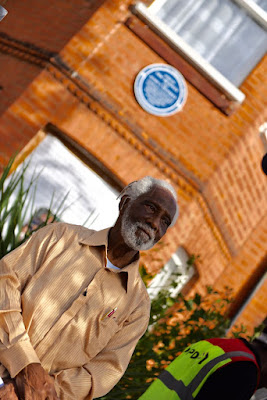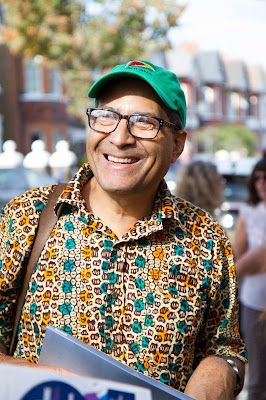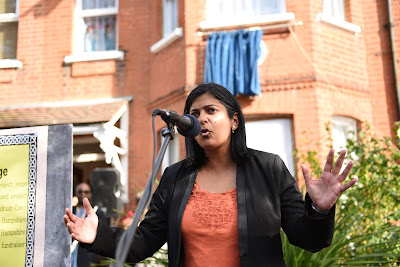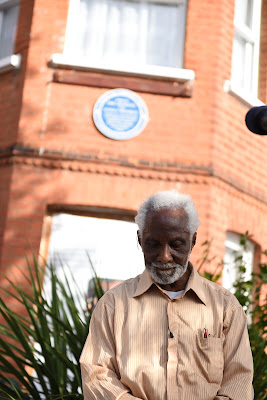
It was impossible to imagine what it would be like. Although riskily scheduled to take place in March (2nd) we could not have anticipated the fair weather which blessed us, bright sunshine, interspersed with a mild breeze but thankfully no rain. Passengers from near and far (local, national and international) lined the pavement at Temple Pier along the embankment in quiet eagerness of what would be the first River Cruise along the Thames, organised by Black History Walks. The cruise was set up to sponsor a Nubian Jak Blue Plaque for Dr Harold Moody, an unsung African (Jamaican) activist and champion of Civil Rights who pioneered the Civil Rights movement in the UK.
Tony Warner had invited me to take part in the historic occasion by brushing up my research on Mary Prince. I was delighted as I would be dressed as this formidable African woman whose book The History Of Mary Prince: A West Indian Slave (1831) was the first account by a black woman to be published in the UK. Her book would become a major instrument for the abolition movement – attesting to the atrocities of slavery as she had personally experienced.
Mary Prince was in fact predecessor of Phyllis Wheatley, ‘played’ by Makaela Simpson for the Cruise. Wheatley, a child genius and the first African-American female poet to have her work published came to England to promote her Poems on Various Subjects, Religious and Moral (1773). We were styled – costumes and make-up by Katherine Nanena. Tony Warner donned a 19th Century outfit, portraying a handsome and fitting homage to another great figure of Black British history – author and abolitionist Olaudah Equiano, whose autobiography – The Interesting Narrative of the Life of Olaudah Equiano or Gustavus Vassa, the African (1789) also formed the slave narrative genre. Enchantingly styled as our ancestors we greeted the guests with warm hearts but sober, contemplative faces as we marvelled at the impact of what we were doing – without previously anticipating what this would be like.




Our narrator on the Cruise was Black Historian Steve (S.I.) Martin who guided us on the two-and half-hour tour along the Thames – noting sites like Cleopatra’s Needle, West Indian Docks area, Mary Seacole Statue – positioned outside St Thomas Hospital. It was a needle-in-haystack stretch to see it from the boat but the knowledge that it was there along with the history of Mary Seacole’s contribution to British history was insightful. This is just a sample of the experience – part of which was made special by the presence on the Cruise of notable community activists and leaders of Black History: Robin Walker (along with Tony Warner, I feel an honorary doctorate for him is overdue), Professor Dr Elizabeth Anionwu, Mia Morris, Dr Lez Henry, Nia Imara, Avril Nanton, Emmanuel Amevor (whose books made a good educational complement to the day). Apart from the lack of refreshments aboard the boat, and minor first time niggles (the mic playing up and some passengers believing it was their annual family coach trip to Margate and being somewhat rowdy) the 180 guests left with all smiles. Intermittent music and our (Mary Prince, Phyllis Wheatley and Olaudah Equiano’s) recounting of our stories added to Steve Martin’s narration about the historical sites pertinent to Black British History.







Once donned as Mary Prince, I confess feeling the ancestral vibrations permeating – not just mine but everyone’s. It’s difficult to write about it without seeming sentimental and gushy but certainly it (has) lingered –not least because the Bus Tour followed the next day (March 3rd). This day severely contrasted the previous sunshine blessed – the blessing instead was from some persistent wintry rain. We were in a comfortable luxury tour bus, however – about 70 or so passengers who were quietly – it seemed to me lapping up the experience. Again Steve Martin narrated as we made our way from Brixton (Black Cultural Archives), noting sites such as the location of Claudia Jones’ newspaper headquarters – The West Indian Gazette which was the first significant Black British newspaper (1958). We also learnt of a ‘black woman’ who relied on the then social services to alleviate her of poverty (or being destitute) – and later industriously lifted herself up enough to repay (oddly as noted by Steve Martin) the fund she’d been given. We drove through central London, noting Black History sites all along the way – including that of the location in Piccadilly Circus where Sarah Baartman was cruelly exhibited as a spectacle for European gaze and its objectification of the Black female body. We also touched on the area in Clapham where there was much activism on abolition and we also learnt of the work of Dr Harold Moody – in whose honour both Cruise and Tour was in part initiated. Among the many stories Steve Martin shared with us I enjoyed hearing about Guyanese Andrew Watson who was the first Black footballer in Scotland. Not only did he play professionally he also Captained Scotland when they thrashed England 6.1 (c.1882). He seemed to vanish from history soon after. The more we do our Black History Tours, the more we hear the fascinating stories of those ordinary or prominent lives that contributed to British social, cultural and economic life. In the case of Andrew Watson, it’s noteworthy that he had sound financial means – just as Mary Seacole (contrary to the belief that she didn’t, Steve Martin relayed the fortune she left upon her death) and Olaudah Equiano. Much more could be said but you need to do the tour and experience them for yourself. It was wonderful to see the happy smiles dismounting the bus at the end of the tour, including some who had done the River Cruise the day before! We were also joined by Mark and Charmaine Simpson of Black History Studies.



The Blue Plaque for Dr Harold Moody Unveiled
The circle – or part thereof – was completed with the installation on March 13th of the Nubian Jak Blue Plaque in honour of Dr Harold Moody. This was on the 88th anniversary of the founding of the League of Coloured Peoples by Dr Moody and others at the first YMCA in central London. He was born in Jamaica and travelled to London to study medicine at Kings College London. He qualified top of his class, but due to colour prejudice couldn’t find work in the profession and opted instead to set up his own practice in Peckham. There are memorials to him in the area, which we learnt about on the Bus Tour. He campaigned against racial injustice and became the president of the League of Coloured Peoples (LCP) which was set up in 1931 to advocate for Civil Rights and equality. Members of LCP included, Jomo Kenyatta (Kenya’s first President following independence), CLR James, Una Marson (first black female to be aired on British TV) and Paul Robeson (I dream that some progressive, conscientious filmmaker somewhere is making a film about him, as he was such a formidable force of the civil rights movement, appearing hither and there in accounts about others – he needs his own sound narrative).






When it was his turn to address those gathered on the chilly Wednesday afternoon to pay tribute to Dr Moody, Tony Warner remarked that although he had been advocating for Civil Rights in the UK decades before Martin Luther King in the US, the latter is taught on the British Curriculum but not Moody. This must change. During the River Cruise and Bus Tours (there was another on 9th March) Tony Warner thanked all the passengers for making it possible for the installation of the plaque which is located at the Central YMCA on Great Russell Street, London. It was touching, I thought, that this was the YMCA where Tony Warner once had refuge – being able to sponsor the Plaque must have been a remarkable homage for him. Tributes were also made by Councillor Jenny Headlam-Wells, Mayor of Camden, Councillor Louise Hyams – Deputy Lord Mayor of Westminster, Mrs Tracey Blackwood from the Jamaica High Commission, Rosie Prescott Chief Executive of the Central YMCA, Neil Flannigan MBE, Marc Wadsworth (Founder of the Anti-Racist Alliance), Raoul Dero (reading a poem for Harold Moody). A surprise speaker was introduced as a relative of Moody, David (his last name I didn’t catch), who had only heard about the unveiling that morning and turned up to give a brief tribute. Jak Beula was moved by the experience, as he told us, because he had hoped there might be some member of the family to take part as is expected at such momentous events. Such, he observed was the ancestral vibration that even in the nth hour and Divine Order his call was heard.






More on Mary Prince
And such it was that my moments with Mary began to take on ancestral vibrations. I wasn’t satisfied that we didn’t know anything more about her life after the abolition act was passed, and her appearance in court in two libel cases in the early 1830s. I shared images of us in our costumes on Instagram and facebook. Jak Beula commented in one of the posts that some years ago he was contacted by a descendant of Captain John Ingham to whom Mary had been sold and against whom they committed ‘heinous’ acts of inhumanity as documented by her in her book. The descendant – Mark Nash offered to pay for the installation Jak Beula was putting up on Senate House for Mary Prince (she lived in the Bloomsbury area of London ) – which was unveiled by the Bermudan Premier (Mary was born in Bermuda). In an interesting twist of history the descendant works for the equivalent of the Commission for Racial Equality in Bermuda. This is what he shared with Jak Beula: “as a descendant of slave holders and as someone involved in anti-racism efforts here in Bermuda, I feel a responsibility to acknowledge and make amends for our history and also to advocate against the systemic racism that continues to result in disparate outcomes here in Bermuda. In my mind, white Bermudians have never truly acknowledged this shared and painful history and certainly not offered any apology. I believe that reconciliation and healing will come from honest and open dialogue between descendants of enslaved peoples and descendants of slave holders. I hope to help move these discussions forward in the coming years.” This is a powerful account of the impact of the work being done by organisations like Black History Walks and Nubian Jak and the Blue Plaques to acknowledge the many Africans who struggled for social justice, equality and civil rights not only in the UK but throughout the world. These lives, for whatever reasons remain veiled and it’s up to community activists/leaders/educators to excavate and elevate them to the honours they deserve.
The ancestral vibration persisted as we learnt that there is some work afoot to have a national holiday in honour of Mary Prince during the Emancipation holiday in Bermuda.
Next River Cruise
June 1st (Fast selling out)
June 22nd
Next Bus Tour
April 28th






Shout Out
Check out Way Wive Wordz Website


























































































